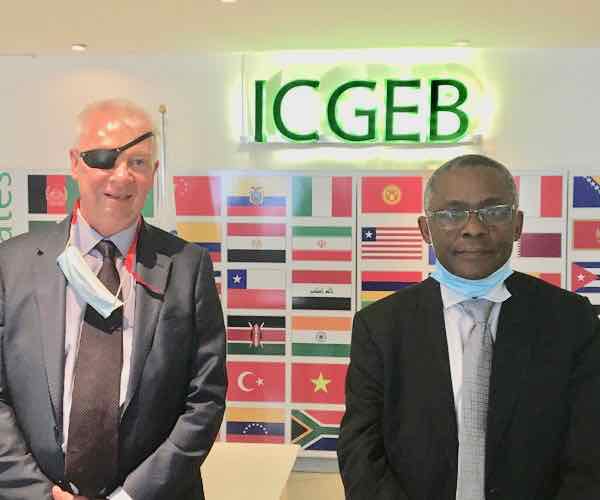
On 22 June 2020, at the ICGEB Headquarters in Trieste, Italy, Dr. Lawrence Banks, ICGEB Director-General and Prof. Romain Murenzi, TWAS Executive Director, have signed the Memorandum of Understanding to implement joint activities. The ICGEB and TWAS/UNESCO share the aim of building capacity in the area of biotechnology and related fields worldwide. The two Trieste-based institutes have agreed to collaborate in the implementation of joint activities, including grant proposals, conferences, courses, exchange programmes, and fellowships, with a special focus on least developed countries (LDCs), women scientists and the African continent.
Joint activities will take place in the strategic areas of biotechnology and related fields, aiming to meet the Strategic Development Goals linked to health, food and energy security, and gender equality. This will be done by fostering cooperation on the promotion of exchange programmes for visiting experts and researchers, both from and to ICGEB’s laboratories and its Regional and Affiliated Centres, thereby promoting South-South and North-South cooperation.
The two Institutes also agree to implement a joint fellowship programme for postdoctoral researchers in biotechnology and related topics with special consideration being given to women from Africa. The awardees can be hosted at one of ICGEB’s three laboratories in Italy, India or South Africa, or at one of its Affiliated or Regional Research Centres. 
Lawrence Banks stated: “The ICGEB and TWAS are at the forefront for promoting international scientific diplomacy and cooperation and we share many of the same goals - using science for development and ensuring that the fruits of modern molecular biology can improve the lives of our populations all over the world. This coming together of ICGEB and TWAS is a perfect synergy and will greatly strengthen each of our own programmes and ensure that we fulfil our noble missions.”
ICGEB’s programmes for capacity building have been operating for more than 30 years. As an instrument of foreign policy and scientific diplomacy, it assists emerging economies and promotes autonomous growth through the use of biotechnology for economic and social development.
The signing of this Agreement takes place a decade since the passing of ICGEB’s founding father and Director General, Prof. Arturo Falaschi. His legacy lives on in driving the mission and vision of the organisation to bring advanced research, training, and capacity enhancement to developing and emerging economies.
Romain Murenzi added: “Biotechnology is a growing field in many developing countries, with applications for food production and health, amongst others. TWAS has been implementing programmes for capacity building in the global South since it was founded by Abdus Salam and his colleagues, in Trieste in 1983. Collaborating with the ICGEB is a natural step. We expect our synergies to yield new programmes, increasing our impact on the developing world and clearing more paths toward sustainable development.”
Over the past years, TWAS supported numerous projects in biotechnology in more than 30 developing countries. Also, back in 2013, in a joint effort with the Chinese Academy of Sciences, TWAS established strategic centres of excellence in Beijing, including the CAS-TWAS Biotechnology Centre of Excellence. Its director, Prof. Yin Li, later published a report titled “Biotechnology in the Developing World: Growth and Competitiveness”, which was endorsed by TWAS.
The Memorandum of Understanding with the ICGEB is, therefore, a milestone for TWAS in its mission to strengthen science and research in developing countries. In particular, the sister institutes of the ICGEB in South Africa and India are ideally placed to complement and support some of TWAS’s ongoing initiatives that are based on South-South cooperation.

